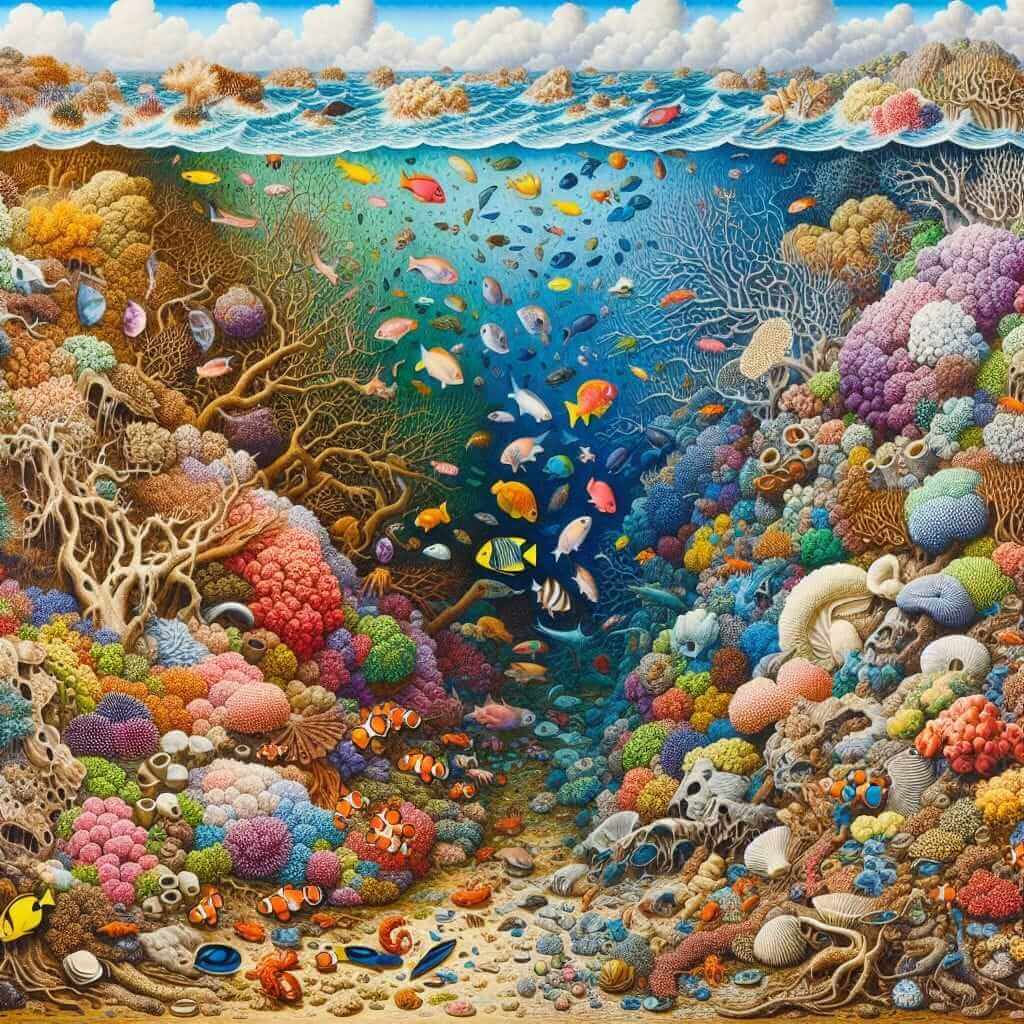The IELTS Reading section is a challenging yet crucial part of the IELTS exam. One of the frequently tested topics is environmental issues, including climate change and its multifaceted consequences. Over the years, the subject of climate change has appeared in numerous IELTS Reading tests, indicating its high relevance and likelihood of recurrence in future exams. This article will discuss the effects of climate change on ocean acidification, a vital topic that not only sharpens your reading skills but also prepares you for questions you might encounter in the IELTS test.
Reading Passage: Effects of Climate Change on Ocean Acidification (Medium Text)
Reading Passage
Ocean acidification refers to the gradual increase in the acidity of the world’s oceans. With the advent of industrialization, human activities have significantly raised the levels of carbon dioxide (CO₂) in the atmosphere. Roughly one-third of this CO₂ is absorbed by the oceans, leading to chemical reactions that produce carbonic acid. This increase in oceanic acidity has far-reaching effects on marine life and ecosystems.
When CO₂ dissolves in seawater, it forms carbonic acid, which dissociates into bicarbonate and hydrogen ions. The surge in hydrogen ions lowers the water’s pH, making it more acidic. This acidity impedes the ability of marine organisms like corals, mollusks, and some plankton to form calcium carbonate shells and skeletons, critical for their survival.
Coral reefs are particularly vulnerable to acidification. Coral polyps construct their calcium carbonate skeletons through a process called calcification. High acidity diminishes this capacity, leading to weaker reefs that are more susceptible to erosion and less able to support diverse marine species. The decline in coral reefs directly impacts fish populations and broader marine biodiversity.

Another concern is the effect on plankton, the tiny organisms that form the base of the aquatic food web. Many planktonic species also rely on calcium carbonate structures. Ocean acidification threatens their existence, disrupting the entire food web and affecting species higher up, including commercial fish species vital to human economies.
Moreover, ocean acidification exacerbates the effects of other climate-related factors like rising sea temperatures and deoxygenation, leading to a compound effect that further stresses marine ecosystems. This convergence of adverse conditions exacerbates the threat to oceanic biodiversity and hampers the ocean’s ability to act as a carbon sink, creating a feedback loop that accelerates global climate change.
Questions
Question 1: Multiple Choice
Why is ocean acidification increasing?
A. Because of rising sea temperatures.
B. Due to increased levels of CO₂ in the atmosphere.
C. As a result of overfishing.
D. Because of deoxygenation.
Question 2: Identifying Information (True/False/Not Given)
- Ocean acidification primarily affects freshwater bodies. (True/False/Not Given)
- Increased ocean acidity makes it harder for marine organisms to form shells. (True/False/Not Given)
- Coral reefs are unaffected by ocean acidification. (True/False/Not Given)
Question 3: Matching Information
Match the following marine organisms to their respective sensitivities to ocean acidification:
- Coral reefs
- Mollusks
- Plankton
A. Struggle to form calcium carbonate shells.
B. Dependent on calcium carbonate structures for survival.
C. Susceptible to weaker calcification processes.
Question 4: Sentence Completion
Complete the following sentences with NO MORE THAN TWO WORDS.
- Ocean acidification is caused by increased levels of __ in the atmosphere.
- Coral reefs are made up of __ formed through calcification.
- The base of the aquatic food web is formed by __.
Answer Keys
- B
-
- Not Given
- True
- False
-
- C
- A
- B
-
- carbon dioxide
- calcium carbonate
- plankton
Common Mistakes
- Misinterpreting key details: Pay close attention to what is explicitly stated versus implied.
- Overlooking specific information: Do not assume; rely on the text for evidence.
- Conflating true/false with not given: Clearly distinguish between not given (information is missing) and false (incorrect information).
Vocabulary
- Acidification (n.) – /əˌsɪdɪfɪˈkeɪʃən/: The process of becoming acidic.
- Calcification (n.) – /ˌkælsɪfɪˈkeɪʃən/: The accumulation of calcium salts in a body tissue.
- Deoxygenation (n.) – /diːˌɒksɪˈdʒiːnɪkeɪʃən/: The removal of oxygen.
Grammar Focus
-
Passive Voice:
- “Coral reefs are particularly vulnerable to acidification.”
- Used to emphasize the action rather than the subject.
-
Complex Sentences:
- “This convergence of adverse conditions exacerbates the threat to oceanic biodiversity and hampers the ocean’s ability to act as a carbon sink.”
- Demonstrates relationship and cause-effect.
Tips for Scoring High
- Practice Regularly: Consistent practice increases familiarity with various topics and question types.
- Develop a Strategy: Skim the passage first, then tackle the questions.
- Expand Your Vocabulary: A broad vocabulary aids in understanding complex texts.
By practicing with realistic passages and honing your reading strategies, you can significantly improve your performance in the IELTS Reading section.